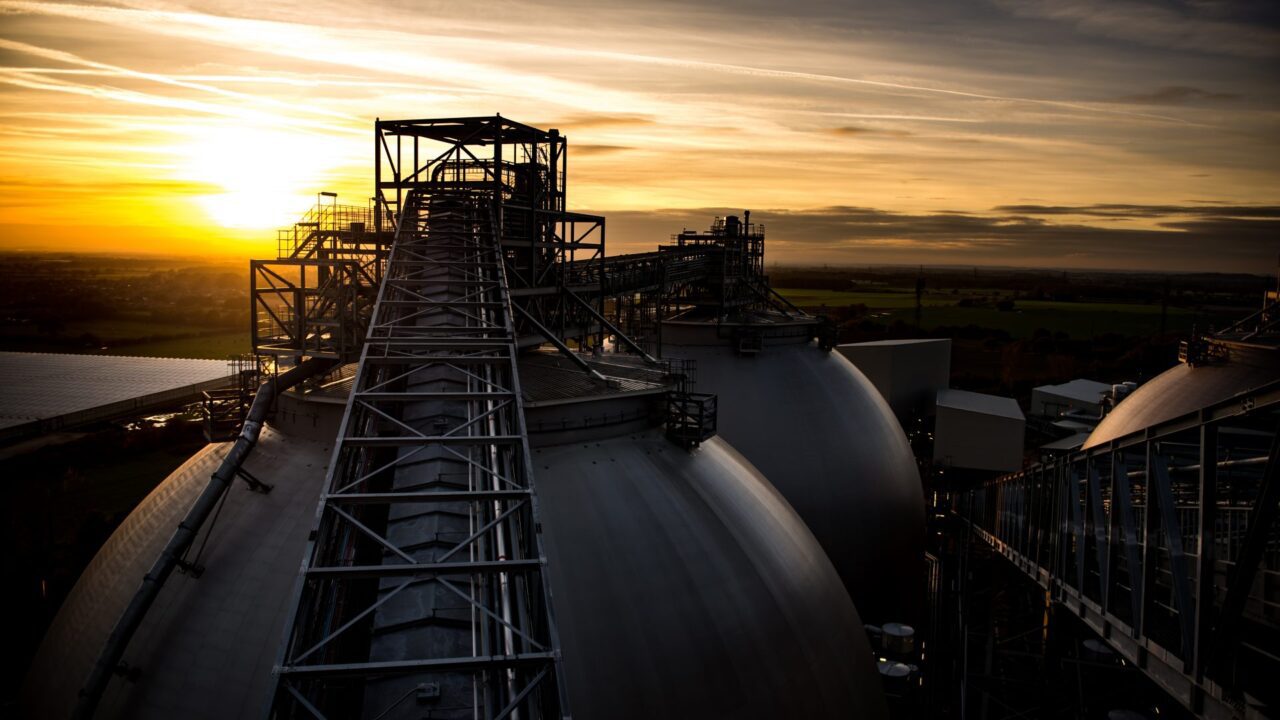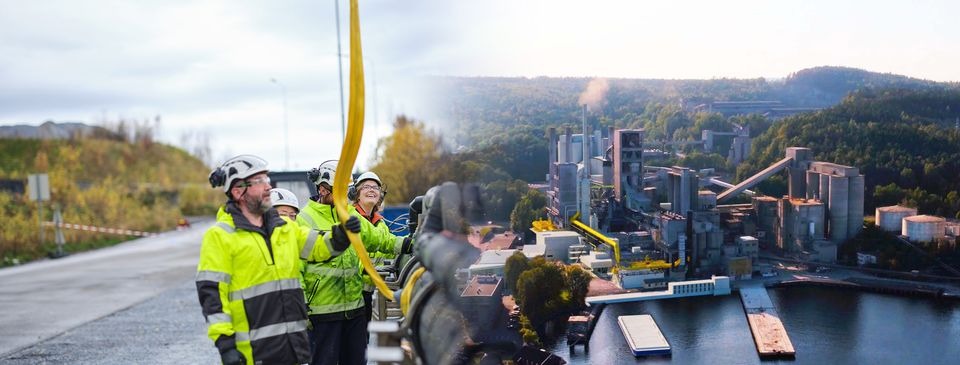
Bioenergy with Carbon Capture and Storage (BECCS) has emerged as a promising solution to combat climate change. By combining biomass energy production with carbon capture, BECCS aims to reduce atmospheric CO₂ levels.
Several companies are at the forefront of this innovative technology, each contributing uniquely to its development and implementation.
>> RELATED: Unlocking BECCS Potential: How Non-Net-Zero Countries Can Drive Climate Progress

Drax Group: Transforming Energy Production
Drax Group, a British power generation company, has made significant strides in BECCS technology. Historically a coal-fired power station, Drax has transitioned to biomass energy, utilizing wood pellets as a renewable fuel source.
In 2019, Drax initiated a BECCS pilot project at its North Yorkshire plant, aiming to capture one tonne of CO₂ per day. Building on this success, Drax announced plans in 2024 to invest up to $12.5 billion in developing BECCS power plants in the United States over the next decade.
These plants are expected to remove approximately 1.5 million tonnes of CO₂ annually, contributing substantially to carbon reduction efforts.
Carbon Clean: Innovating Carbon Capture Solutions
Carbon Clean, founded in 2009 and headquartered in London, specializes in cost-effective carbon capture technologies. Their proprietary amine-based system improves energy efficiency, making carbon capture more accessible for industrial applications.
By forming partnerships with major energy producers, Carbon Clean is scaling its technology to help industries meet carbon reduction goals.

>> In Other News: Drax Launches Enhanced Approach to Global Sustainability
Aker Carbon Capture: Advancing Industrial Applications
Aker Carbon Capture, a subsidiary of Aker Solutions, is focused on industrial carbon capture applications. Utilizing a proprietary amine-based process, Aker’s solutions are designed for industries such as cement production, where CO₂ emissions are difficult to mitigate. Aker’s technology provides a scalable and energy-efficient way for companies to integrate carbon capture into their operations.
Mitsubishi Heavy Industries: Collaborating for Carbon Reduction
Mitsubishi Heavy Industries (MHI) has played a key role in developing large-scale carbon capture technologies. In partnership with Drax Group, MHI installed a BECCS pilot facility at Drax’s North Yorkshire power plant in 2020.
This collaboration led to a long-term agreement for Drax to utilize MHI’s Advanced KM CDR process™️ technology in its BECCS operations.
Archer Daniels Midland Company: Implementing BECCS in Ethanol Production
Archer Daniels Midland Company (ADM) has successfully integrated BECCS into its ethanol production process. The Illinois Industrial Carbon Capture and Storage (IL-CCS) project in Decatur captures CO₂ from ADM’s ethanol plant and stores it in deep geological formations. This initiative has sequestered millions of tonnes of CO₂, demonstrating that BECCS is viable beyond power generation.
The Road Ahead for BECCS Technology
The continued expansion of BECCS is critical for achieving global carbon neutrality. Despite its potential, large-scale deployment still faces financial and logistical hurdles. Policymakers and businesses must work together to accelerate research, refine technology, and develop incentives for adoption.
Detlef van Vuuren, a senior researcher at the PBL Netherlands Environmental Assessment Agency, highlights the urgency of making informed decisions regarding BECCS implementation:
"I believe by far the most important question now is how to make decisions in the period up to 2020 on mitigation strategies for the next centuries in the light of the fact that most scenarios in the literature rely on negative emissions in the second half of the century to meet stringent targets. Should decision-makers follow the results of these models, and take the risk that these technologies will potentially not emerge and thus locking us in in higher concentration levels? Or should decision makers implement even stronger short-term emission reductions – even the 'with-BECCS' scenarios are ambitious – and thus keeping options open? It would be good if science could help decision-makers with that crucial question."
As BECCS continues to gain traction, companies such as Drax, Carbon Clean, Aker Carbon Capture, Mitsubishi Heavy Industries, and ADM are leading the charge in scaling this technology. If successful, these projects could set the stage for a more sustainable, low-carbon future.
Subscribe to the newsletter
Daily decarbonization data and news delivered to your inbox
Follow the money flow of climate, technology, and energy investments to uncover new opportunities and jobs.
Companies
Latest issues
-
This $4.1M Deal Could Change Carbon Capture's Playbook
Inside This Issue 🗜️ CarbonQuest Lands $4.1M Alberta Deal on Gas Compressors 🛡️ CADO, 123Carbon, and Assure SAF Registry Join Forces to Tackle SAF Integrity Gaps ✈️ ISCC, OMV, and Airbus Partner t...
-
Can Koloma Crack Iowa's Billion-Year-Old Secret?
Inside This Issue ⛏️ Iowa's Hydrogen Rush: Can Koloma Strike Gold Before Rules Kick In? ✈️ Bentley Commits to Use 100% Sustainable Aviation Fuel for Car Airfreight 🌬️ Minister Parrott Provides Upd...
-
$47M Just Poured Into This SAF Producer
Inside This Issue 💰 LanzaJet Announces $47M in New Capital and First Close of Equity Round at $650M Pre-Money Valuation 🚢 Maersk's Ethanol Bet Could Reshape U.S. Fuel Markets 🪨 Canada Nickel and t...
Company Announcements
-
RCJY and Climeworks Deepen Partnership to Advance Large-scale Direct Air Capture in Saudi Arabia
Key takeaways: Under the guidance of the Ministry of Energy, the Royal Commission for Jubail and Yanbu and Climeworks have signed a Memorandum of Understanding to expand their collaboration on de...
-
CHARBONE Confirms New UHP Hydrogen Orders and its First UHP Oxygen Order in the United States
Brossard, Quebec, February 25, 2026 – CHARBONE CORPORATION (TSXV: CH; OTCQB: CHHYF; FSE: K47) (“CHARBONE” or the “Company”), a North American producer and distributor specializing in clean Ultra Hi...
-
Climeworks Establishes Canadian Headquarters in Calgary
Calgary, Alberta, February 20, 2026 — Climeworks, a global leader in commercial carbon removal, has established its Canadian headquarters at Calgary’s ETC, one of Alberta’s leading hubs where start...
-
MIAMI, Feb. 24, 2026 /CNW/ - Power Sustainable Infrastructure Credit ("PSIC") recently closed an $85M senior secured financing for Sagepoint Energy ("Sagepoint"), a vertically integrated renewable ...
